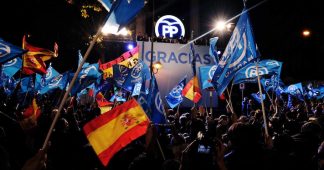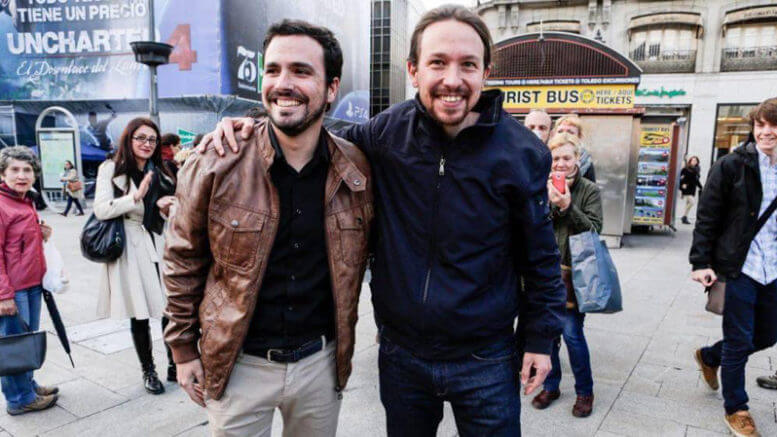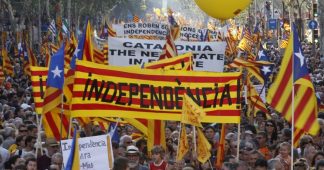Spain: Socialist Party bosses behead leader to allow conservatives to rule
By Dick Nichols
October 13, 2016 — Links International Journal of Socialist Renewal — In late September and early October two heavy political bomb blasts shook the already unstable foundations of the Spanish state.
On September 28, Carles Puigdemont, premier of Catalonia and head of the pro-independence Together For The Yes (JPS) regional government, told the Catalan parliament that the country would decide its relation to Spain by September 2017 through “a referendum or a referendum”.
That is, Catalonia would try one last time—its eighteenth attempt—to have the negotiated Scottish-style plebiscite that is possible under section 92 of the Spanish constitution: if denied, the referendum would be held under Catalan law. Puigdemont’s statement made it crystal clear where the Catalan independence movement was headed—to a decisive showdown with the Spanish central government unless “Madrid” had a shock attack of democratic principle.
On October 1, the 253-member Federal Political Committee of the Spanish Socialist Workers Party (PSOE) rejected, by 132 votes to 107, the proposal of national secretary Pedro Sánchez to hold a new election for party leader and convene an emergency party congress.
The purpose of the congress was to have the membership decide whether the PSOE should maintain its veto on the formation of a conservative Popular Party (PP) government led by prime minister Mariano Rajoy. Sánchez was continuing to back this veto in the knowledge that the majority of PSOE members support it, even though after two inconclusive general elections Spain has had a caretaker PP government for over nine months. The point of the new election for party leader was to allow a vote of confidence in Sánchez.
If it did maintain the veto, the PSOE’s choice would then be either to try to form an alternative government though negotiations with forces mainly to its left or to send Spain directly to its third general election in a year.
The negotiations would be with radical force United We Can (made up primarily of Podemos and the United Left), with the multi-tendency convergences of which they are also part[1], and with Basque and Catalan nationalist parties. However, by early September, various regional PSOE leaders (“the barons”) and former PSOE prime ministers had become highly alarmed at the prospect of negotiations with United We Can and “those opposed to the unity of Spain”.
The thought that these talks might end in a “Frankenstein government” (term put into circulation by former PSOE leader Alfredo Rubalcaba) led the barons to upgrade operations against their national secretary from white-anting to coup-plotting. Their offensive included a statement by Andalusian premier Susana Díaz that the PSOE could not possibly govern with only 85 MPs out of 350 as well as former prime minister Felipe González’s claim that Sánchez had broken his private promise to him that the PSOE would eventually sanction a PP government (González had launched a push for PSOE abstention in early July).
To a war cry of “first the interests of Spain, then those of the party” the anti-Sánchez forces (the “critical sector”) then conspired for 17 members of the PSOE’s day-to-day leadership, its 38-member Federal Executive Commission, to resign. They claimed on this basis that this body no longer existed constitutionally and that Sánchez–the first-ever PSOE national secretary to be elected by direct vote of the party membership–had also ceased to be national secretary. In response, Sánchez and his supporters continued to meet as the PSOE executive committee and to organise for the Federal Political Committee, the PSOE’s highest body between congresses, to support his proposal.
The October 1 gathering of this body was described by participants as “phantasmagorical” and “more an Inquisition trial than a committee meeting”. It lasted 13 hours, with its agenda consumed by attempts of the Sánchez supporters to have a secret ballot so as to allow its more spineless supporters in the federations dominated by the “critical sector” not to have to show their hand. Outside hundreds of protesting Sánchez supporters waved “No Means No!” placards and shouted “shameless oligarchs” and “putschists” at anti-Sánchez committee members.
But Sánchez did not have the numbers. When the meeting finally rejected his position, he had no choice but to resign. In his place and that of the Federal Executive Committee now sits an 11-person management committee with an anti-Sánchez majority, headed by the premier of Asturias, Javier Fernández. It has no representative from nine of the PSOE’s 17 federations and will run the PSOE until the next party congress, a date for which has yet to be set.
Painful choices
The coup against Sánchez and the Puigdemont government’s clarification of how Catalonia will decide its future might look like unrelated events, but they are inextricably linked—and not in the way suggested by some loopier conspiracy theorists who have been arguing that Sánchez’s sacking was a “happening” arranged by the PSOE to steal the media spotlight from the troublesome Catalans!
The truth is much simpler and much nastier. It lies in the answer to this question: why did Pedro Sánchez, who began his brief two-year stint as PSOE national secretary as the poster-boy of the barons and of the PSOE-aligned wing of the Spanish establishment,[2] end up being knifed by the very same people?
The story begins with the June 26 Spanish general election result, which produced a slight strengthening of the PP but no ready governing majority, and left the PSOE with three painful options.
First, it could continue to block the PP without trying to form an alternative government. But this tactic had already worn very thin, and not only because all sides of politics have been demanding of Sánchez that he come clean on his formula for an alternative government. (This pressure was inevitable after the failure of Sánchez’s initial scheme of a “progressive” government based on a deal with neo-liberal outfit Citizens, which he then offered to Podemos on a take-it-or-leave-it basis.)
In this context this first option could only lead to the second–of facing yet another Spanish general election in one year—or the third, of trying to negotiate an agreement for a government to the PSOE’s left. A third election would have taken place when all recent polls show PSOE support stagnating at around 20% and Spain’s social democracy probably losing its thin advantage over the forces grouped around Podemos. Panicked regional PSOE leaders were talking of their party being reduced to 50-seat rump.
Thus, Sánchez’s tactical challenge was to negotiate for support from Podemos and the Basque and Catalan nationalists: if the radical formation and its allies refused his terms for supporting a PSOE government, Sánchez could at least go to a third general election with some chance of marketing the PSOE as holding the moral high ground against its “sectarian” competitors for left hegemony.
This had been Sánchez’s tactic with his deal for “a government of change” negotiated with Citizens after the December 20 election, but it failed for the simple reason that few on the left believed a government agreement with Citizens could be progressive. When the Podemos membership overwhelmingly rejected it in an internal referendum the formation paid very little, if any, price on the broader left.
However, all the indications were that this time Podemos and its allies would be prepared to arrive at some sort of accommodation with the PSOE over government (with a developing internal debate in Podemos over whether it should insist on participation). The Catalan nationalist right (in Democracy and Freedom, DiL) had already indicated that it was prepared to drop the demand for a Scottish-style referendum on independence as the price of its support. As for the centre-left Republican Left of Catalonia (ERC), it was still insisting on the referendum but had yet to really focus on whether it wanted to be the last obstacle to getting rid of the hated Rajoy government.
Road to downfall
The results of the September 25 regional elections in Galicia and the Basque Country would only have strengthened Sánchez’s reluctance to face the voters. In the Basque Country the Socialist Party of Euskadi (PSE), went from 16 seats to 9, two seats less than the Basque Country affiliate of Podemos.[3]
In Galicia, the Party of Socialists of Galicia (PsdeG) lost four of its 18 seats, ending up on the same seat score as En Marea (grouping together the left-nationalist ANOVA, the Galician affiliates of the United Left and Podemos and other smaller forces), but with only 17.9% of the vote compared to the 19.1% for En Marea. En Marea is now the official opposition in the Galician parliament—a further small step in the “Pasokisation” of the PSOE.
The Galician election also saw the successful continuation of the PP’s “either us or chaos” fear tactic, which had produced gains for it in the June 26 Spanish election. The PP, which has more members in Galicia than all other parliamentary parties combined, put its vast electoral machine into motion to get “its” people out to vote.
The result was that the participation rate climbed a huge 8.8% to 63.75%. The PP, an authoritarian, corruption-ridden enforcer of austerity, won 15,000 extra votes, kept its 41 seats in the 75-seat Galician parliament and increased its share of the vote from 45.8% to 47.5%. Galicia remains the only region in the Spanish state ruled by a government with an absolute majority.
The rise in the conservative vote was greatest in Lugo and Ourense, the two more rural of Galicia’s four provinces. These were also the regions where participation jumped most (by 14.6% in Ourense, where the PP won 53.1% and an extra seat).
The PP’s success came through a campaign in which its logo was disappeared and premier Alberto Núñez Feijoo was boosted as a calm and competent manager and Galicia’s guarantee against an “alphabet soup” government of the “reds” (En Marea), the PSdeG and the centre-left nationalist Galician Nationalist Bloc (BNG).
In the light of these results, the Sánchez leadership sped up its plans for negotiations with Podemos and the Basque and Catalan nationalist forces with a view to their backing a single-party PSOE administration. At the same time, the “critical sector” laid the blame for the poor results on Sánchez’s intransigence, but as Sánchez himself asked: “Can anyone explain how allowing the PP to govern would have won us more votes?”
According to a reconstruction by journalist Enric Juliana of the events leading to Sánchez’s downfall in the October 9 La Vanguardia:
Sánchez’s circle had a three-page programmatic document ready for consideration by Citizens, Podemos, the Basque Nationalist Party (PNV), the Valencian party Commitment and the pro- sovereignty Catalan forces…
The road map outlined in the three pages would have gone like this. First phase: negotiate the support of Podemos and the abstention of Citizens. Second phase: seek out the support of the pro- sovereignty Catalans in the case that Citizens inclined to rejection. It relied on the abstention, at the very least of the Basque nationalists … and on the enthusiastic support of Commitment, which is organically separate from United We Can.
Sánchez’s plan was based on the assessment that the PSOE’s chances of winning the struggle for leadership of the left depended critically on not allowing a PP government to form. To overcome the predictable resistance of the barons he proposed to put the decision into the hands of PSOE membership. Little wonder, then, that the baronial conspiracy against him enjoyed the tacit and open support of the entire Spanish establishment—the monarchy and the country’s economic, judicial, media and ecclesiastical powers-that-be.
Within this establishment nervousness has been gradually rising over a number of issues that will require “strong government” to solve: besides the weeping wound of Catalonia, there’s growing deficit and debt on which the European Commission is demanding action as well as the first signs that the ratings agencies might again be putting Spain in their spotlight. None of this can be addressed without a government that is able to bring down a budget that introduces another round of austerity and strengthens the defences of Spanish unity against the Catalan rebellion.
In such a context it was hardly surprising that, within a matter of months, the PSOE’s handsome and youthful bright hope against the Podemos threat was being described as an “unscrupulous fool” who was putting the stability of Spanish economy and institutions at risk with his political flirtations (October 1 El País editorial).
Unfortunately, however, Sánchez’s scheme was no carefully planned rebellion against the status quo. With no strategic goal other than that of surviving as PSOE leader and ousting Rajoy, he arrived at his plan for an alternative government in the worst way possible—as a last minute manouevre worked out behind closed doors, without public debate and with only desperate, last minute, mobilisation of rank-and-file support. This was basically why even the discredited barons (“part of our class of political zombies” in the words of progressive Zaragoza mayor Pedro Santosteve) were able to crush it.
Toward a PSOE split?
With their beheading of their leader the PSOE Federal Executive Committee has not even begun to solve the PSOE’s problems. It now has three weeks to decide whether to end its opposition to having a PP government, an issue on which it remains divided. Even opponents of Sánchez are saying that they oppose allowing Rajoy to continue in power.
The fight could even split the PSOE in two, beginning with a revolt in the Spanish parliament by those PSOE MPs most opposed to Rajoy. They will be led by the MPs of the Party of Catalan Socialists (PSC), the PSOE’s sister party in Catalonia: all its leaders (including the most conservative and bureaucratic) know that such a vote would annihilate a party which is struggling to survive in Catalonia against the left convergence Together We Can.
On October 3, Nuria Parlon, popular mayoress of working-class outer Barcelona town Santa Colomer de Gramenet and candidate for the PSC leadership, called on PSC MPs in Madrid to be prepared to disobey a PSOE decision to abstain in the next investiture vote. On October 6, Susana Sumelzo, the socialist MP for Zaragoza (capital of Aragon) said that she would not abstain to allow the PP to govern “even if the Federal Committee gives the order … we are defending the position that a government of change is possible, as here in Aragon, where policies have changed a lot from what the PP was doing.”
This stance is shared by Francina Armengol, the socialist premier of the Balearic Islands and leader of the federation of the Socialist Party of the Balearic Islands (PSIB), the regional PSOE affiliate. Since October 1, Armengol has said that she is thinking of inviting the local Podemos affiliate to join the Balearic government—at present a coalition between the PSIB and the regionalist force More For Mallorca (Més) that Podemos supports in parliamentary votes.
At the same time, the PSOE mayor of the Andalusian town of Jun has launched a petition demanding an extraordinary congress of the PSOE, and by October 6 claimed to have collected 39,000 of the 93,700 signatures (half the financial membership) needed to require the new leadership to act.
On the other side, interim PSOE manager Fernández told radio station SER on October 4 that under Sánchez the PSOE had started to experience “Podemosisation” and that the PSOE “cannot reach an agreement for government with those who want to break up the country.” In other words, better a broken PSOE than a left PSOE. Moreover, for Fernández “there is one thing worse than a Rajoy minority government—a Rajoy majority government”. Better a weaker PP government now than the stronger PP government that a third election would probably deliver.
Fernández dismissed the prospect of mutiny by any PSOE federation: “I am convinced that the discipline there has always been in the PSOE will prevail and that all will follow the position that we, the bulk of members of the Federal Political Committee, decide.” In the meantime—this is the theory of the barons—having the PP in government would free the PSOE to rebuild itself in opposition, a point that Fernández hammered in an October 4 meeting of the PSOE parliamentary caucus.
Except that it wouldn’t. If the PSOE allows the corrupt and autocratic Spanish right to remain at the helm it will be forever marked by the decision, effectively giving a permanent free kick to Podemos and its allies. This is especially so in a week in which the trials have started of various PP luminaries for involvement in corruption, influence-peddling and other crimes. These trials will dominate the Spanish media in the same weeks as the PSOE has to make its decision.
Conclusion
The coup against Sánchez confirms that the PSOE is already a good way down the road to becoming two parties, a reality that was largely reflected in the Federal Political Committee line-ups for and against the former national secretary. On one side is the PSOE of the regions where the national question is pressing, beginning with Catalonia, but also encompassing the Basque Country, Galicia, the Valencian Country and Balearic Islands (all mostly pro-Sánchez). In these regions, with the partial exception of Galicia, the main political competition is coming from the PSOE’s left: it is under pressure to adopt a more radical message (“podemosise”), especially in the big cities, and also show some sensitivity to national and regional aspirations.
On the other side are the regions where the PSOE is the main establishment party, beginning with Andalusia (where it has never lost power) and Extremadura. Here any concessions to the “nationalities” are taken as a gift to the PP and PSOE grandees outdo the PP in defence of Spanish unity and attacks on “secessionism”.
José Antonio Pérez Tapia, the Socialist Left current’s candidate for national secretary in the 2014 ballot won by Sánchez, described the removal of Sánchez as “mutiny leading to shipwreck” on the Voz Populi web site. For Pérex Tapia, the bureaucratic pirates who have taken over the PSOE have:
… eyes closed and ears blocked so as not to notice the creaking of the hull, the rising tide of water pouring in, the growing discontent of the crew, the abandonment en masse of the passengers…on a voyage that could end nowhere. Or worse still, at the bottom of the sea, which is where the arrogant powers who refitted the neoliberal and conservative fleet are now intent on sending the socialist ship.
In the October 4 El País political scientist Víctor Laupuente Giné had other metaphors for the PSOE predicament:
The PSOE has lost its bearings. Progressive voters in the historic communities, young people and the urban classes identify with Podemos. The PSOE is trapped in a vicious circle: the more it wins in the south and the rural areas, the greater the relative weight of the representatives from these regions on its federal bodies, and the more it distances itself from the rest of the country. In this situation of rising asymmetry, giving more power to “the winners”, as some barons call for, is like trying to defend the Roman Empire by sending legions to the most secure provinces.
And Catalan connection? The PP leadership judges that unyielding war on the Puigdemont government is not only the only way to thwart Catalan aspirations—it also helps it to draw away anti-Catalan votes from an ever-weaker PSOE in the rest of the Spanish state. The tactic also deepens the divide within the PSOE.
So the escalation of operations against the Catalan government will continue: in recent days the Spanish legal system has ruled that the Catalan ban on bull-fighting must be lifted; that former premier Artur Mas should stand trial (and face a possible ten-year ban from public office) for allowing Catalans to vote in the November 2014 consultation on the region’s future; and that Catalan parliament speaker Carme Forcadell must be investigated by the Spanish prosecutor for allowing a vote on the regional government’s road map to independence.
This ever more polarised context of an emboldened PP, a Catalan government determined to fulfil its pro-independence mandate and a crippled PSOE make the interventions by of the left beyond the PSOE—beginning with Podemos– an increasingly critical factor in the political struggle in the Spanish state.
At the time of writing, the Podemos organisational secretary Pablo Echenique has indicated that the regional organisations of the radical formation will be reviewing their support to PSOE governments whose premiers were behind the putsch against Sánchez. Podemos regions will wait to see how these luminaries vote in the PSOE Federal Political Committee that will have to decide on allowing the PP to rule.
In the cases where they seem certain to support PSOE abstention, local Podemos organisations may have a tricky decision to make—can they really continue to act as guarantors of the stability of PSOE regional administrations against the PP if the PSOE creates a shamefaced grosse coalition with the PP at the all-Spanish level?
The issue is already testing the coalitions in which Podemos takes part. In the Valencian Country, for example, Monica Oltra, the deputy premier and leader of the regionalist force Commitment, has said that its governing alliance with the PSOE affiliate is “bomb-proof”. This is despite Ximo Puig, the Valencian premier and leader of the local PSOE affiliate, having supported the removal of Sánchez.
How Podemos can best exploit the crisis of the PSOE and help turn around the beginnings of demoralisation among many left supporters must surely be at the centre of debate at its second citizens’ assembly (congress), due to take place before the end of the year.
Dick Nichols is the Green Left Weekly European correspondent, based in Barcelona. An earlier and shorter version of this article has appeared on its web site.
It was first published in the international journal Links
Notes
[1] In Catalonia Together We Can, in Galicia En Marea («In Tide») and in the Valencian Country A La Valenciana.
[2] Headed by the Prisa media group, publishers of El País.
[3] See detailed coverage here











